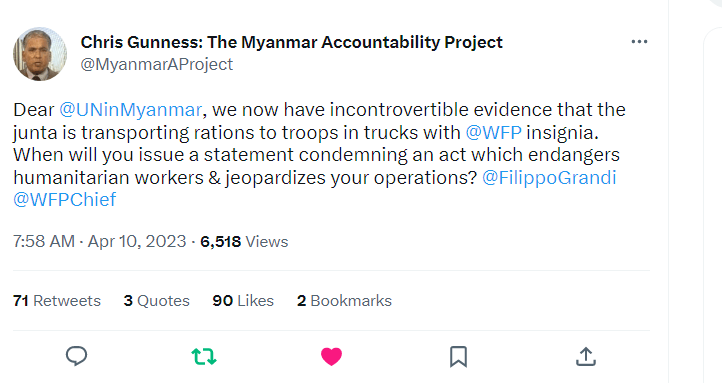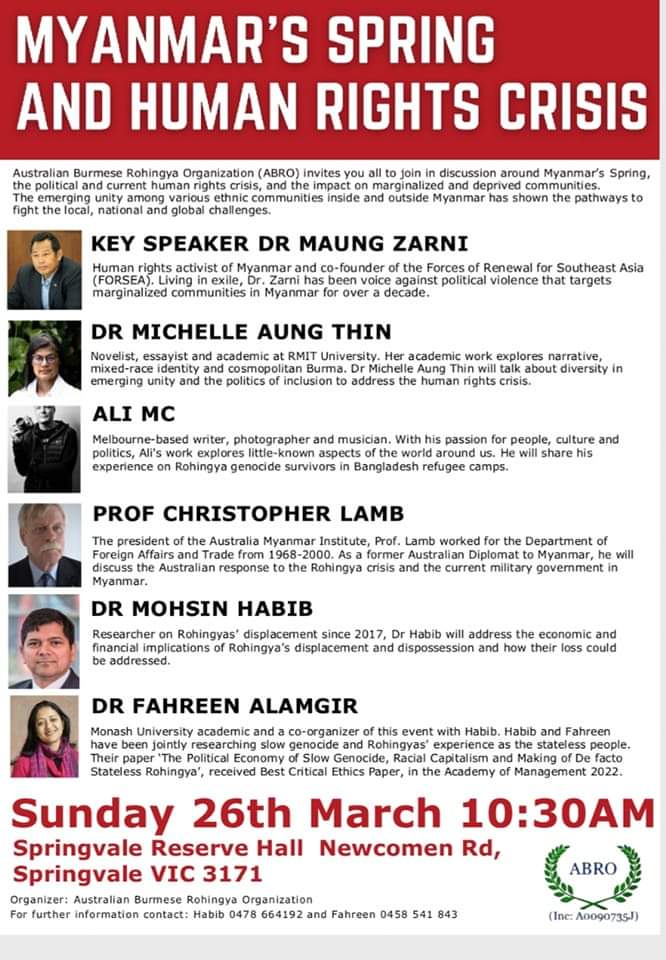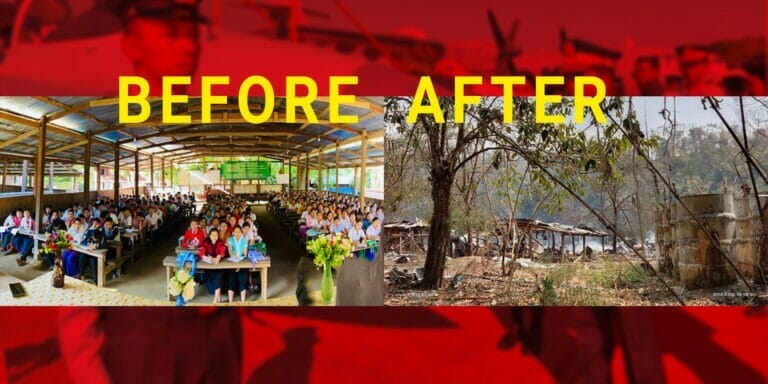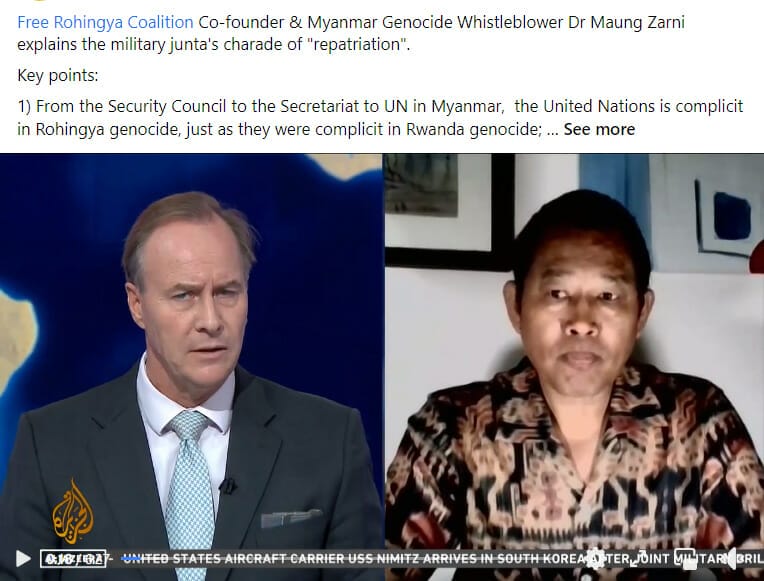After its Abstention on the Myanmar resolution at the Security Council last year, China’s Communist Party Leadership has apparently ended what might be termed “a grace period” to the armed democratic resistance haphazardly led by Aung San Suu Kyi-loyalists and old NLD elements – reincarnated as the “National Unity Government” of the Union of the Republic of Myanmar.
China’s new Foreign Minister Qin Gang may pay lip-service regarding Beijing’s support for the Association of South East Asian Nations (ASEAN) on Myanmar and Indonesian Foreign Minister Retno Marsudi may talk up “ASEAN Centrality” to resolving Myanmar’s intractable and violent crisis through “inclusive dialogue”. But in reality, Beijing’s Special Envoy and other Chinese officials have been sighted in Myanmar’s fortified capital Naypyidaw and Yunnan’s provincial Kunming, meeting with Myanmar junta head Min Aung Hlaing and half-dozen China-linked ethnic armed organizations. Beijing’s stance undoubtedly undermines ASEAN’s centrality, indicating its lack of confidence in both the bloc’s capacity, or lack thereof, and the revolutionary leadership of Myanmar’s National Unity Government.
China knows revolution! Chairman Mao provided material and financial support to the anti-Ne Win Burmese Communist Party (and ethnic armed groups such as Kachin Independence Army) in the late 1960’s and 1970’s for 10 years, only to find itself on the losing side.
It is no coincidence that the coup regime in Naypyidaw proceeded to dissolve 40 political parties – most importantly Aung San Suu Kyi’s ruling, NOT opposition, National League for Democracy party whose leaders have been thrown behind bars on bogus charges after sham trials pronounced their guilty verdicts. Dissolved also was the Shan National League for Democracy party, the party which one the second largest number of parliamentary seats in the 2020 multiparty elections.
In the last three decades since 1990, Myanmar military leadership has patronized multiparty elections only to declare the outcomes null and void, when the electoral results made them feel their personal and institutional interests are threatened.
On 27 March the coup leader Min Aung Hlaing urged the “international community” to support his regime as it ostensibly moves to hold elections once, with China’s nod, while thundering to crush “terrorists”, the reference for anyone and any organization that resists the military’s attempt to hang onto power, after sixty years of ruinous leaderships and policies. With attendance from Myanmar’s neighbours including China, Bangladesh, India and ASEAN (minus two, namely Singapore and Brunei). As the Commander-in-chief of what ASEAN calls “the largest military force” in Myanmar (out of a total of the country’s two dozen armed organizations), Min Aung Hlaing presided over a massive military parade to commemorate what the military calls “the Armed Forces Day”, originally named the “Resistance Day” or the Burmese D-Day for the anti-Fascist Resistance against the occupying Japanese Imperial army in the WWII Burma (1943-45).
A predictable farce
On their part, with the exception of Germany western democratic governments including UK, EU, Australia, and Japan were equivocal at best and silent at worst about the regime’s elections, which is a predictable farce for those of us Myanmar with institutional memories.

Disturbingly, the news of the Myanmar-based UN agencies including the World Food Programme (WFP) providing Min Aung Hlaing’s Ministry of Defence with the vehicles and vassals marked “UN” – either concealed or openly – carrying the military personnel across the borders to Bangladesh refugee camps and UN-provisions of food to the frontlines.
China has reportedly brokered pilot repatriation project of 1,000 Rohingya genocide survivors to a “transit camp” inside Myanmar’s former killing fields of 2017 pogroms. The pictures of the camp resembles more like the Nazi SS’s purpose-built Concentration camps with barbed wire fences and barracks, for instance, that seen at Ravensbrück.
Clearly victims of the geopolitical and commercial circumstances, Myanmar’s loose groups of anti-military regime have a very steep hill to climb. Since the days of Vladimir Ilych Lenin 100 years ago, geopolitics and commercial interests have never really favoured liberation movements, resistance and revolutions. Myanmar today is undergoing both widespread armed and peaceful resistance against the irreformable national armed forces and a social revolution that redefine various gender, ethnic and religious relations, which remain neo-feudal, sexist, racist, homophobic and myopically ethnonationalist. To say that Myanmar people are caught between a rock and a hard place is a vast understatement. Global corporate interests, unsympathetic immediate neighbours, hollow Western support and pragmatic Chinese policies, and “the banality of evil” which UN agencies have come to embody are no small obstacles towards Myanmar’s long road to freedom.
But revolutions must succeed against all odds. Continuing serfdom is no longer an acceptable reality.
Fighting and dying for freedom
From Myanmar’s “international friends” – diplomats and scholars alike – one often hears this typical “we-are-concerned-about-the-violence” in Myanmar. While the concerns are to be appreciated, the fact remains that Myanmar’s wretched of the earth themselves – as evidenced in the community-based resistance – have chosen to fight and die for freedom, than lie die, even in the absence of any meaningful solidarity and support from foreign states. States are busy pursuing their own economic and strategic interests in Myanmar.
Myanmar’s people are evidently no longer prepared to take further rape, abuse, torture, imprisonment and savage beheadings at the hands of the universally reviled Myanmar Armed Forces known as The Tatmadaw, which is scorch-earthing entire villages and striking from air schools, monasteries, churches, hospitals and refugee camps.
https://t.co/9BAp9aKV1t “Myanmar military leadership have, with alarming frequency, deployed fighter jets, helicopter gunships and artillery to strike civilian targets including Christian churches, Buddhist monasteries, schools, clinics and hospitals.”
— FORSEA (@officialFORSEA) March 3, 2023
Full report: Myanmar Air Force targets civilians, clinics and schools (dhakatribune.com)
These days, the word “dialogue” will get any Myanmar “cancelled”. The Security Council-endorsed “inclusive dialogue” has become a mantra among state functionaries and policy-types. But China that Abstain-ed shows no interest in inclusivity of dialogue as a peaceful way to solve Myanmar’s decades-old strife.
But the diplo-speak has no takers among the 50-million Myanmar either.
The only difference between the Beijing and Myanmar public is who they back.
A large segment of Myanmar mainstream public may remain neo-feudal in their dogged loyalty towards Aung San Suu Kyi whom they call Mother Suu. But they aren’t fools: they have had 30-years of witnessing the collapse of “dialogues” “mediations” “ceasefire talks” “sham elections”.
No sane Myanmar believes in the Zero-Sum war against their repressive military. But no community of resistance will sue for a dialogue, while mass-slaughter, savage killings and semi-genocidal campaigns are going on. Lenin’s 100-years-old question “What needs to be done?” remains as vitally relevant to Myanmar’s democratic resistance, as it was in the context of Tsarist Russia, backed by French bankers and British interests at the close of the 19th century.


Cogent and grounded analyses
Against these deeply disturbing developments, FORSEA offers cogent and grounded analyses and perspectives both by the co-founder Myanmar dissident scholar Maung Zarni and others with unparalleled first-hand knowledge of the country’s affairs including the founder of the Free Burma Rangers David Eubank and Sai Tun Aung Lwin.
Here are some of the analyses shared on FORSEA and other platforms such as Al Jazeera English, Wire.In and Democratic Voice of Burma.
- Is China Mediating Conflicts in Myanmar?, Sai Tun Aung Lwin, FORSEA, April 5, 2023
China’s approach towards peace and stability lacks any real prospects for peace. For the Chinese are pursuing stability in Myanmar only to the extent it serves to protect their economic, security, and energy interests, not peace for Myanmar as a whole.
- Bureaucratic Despair at the United Nations Human Rights Council, but Hope, Love and Strength amongst Myanmar’s Resistance Communities, Maung Zarni (based on the FORSEA Dialogue with David Eubank), FORSEA, 9 March 2023
- Maung Zarni explains the military junta’s charade of China-brokered “pilot repatriation” of 1,000 out of 1 million Rohingyas, Al Jazeera English, 29 March 2023.

- On the political economy of the Rohingya genocide – and repatriation attempts – FORSEA published The Anatomy of the Political Economy of Slow Genocide, and Organising of Racial Capitalism– A Tale of the Making of De Facto Stateless Rohingya, Habiburahman, & Fahreen Alamgir, March 30, 2023
The paper discusses the political economy of genocide by exploring the organising of genocide against the world’s largest de facto stateless community – the Rohingya community of Myanmar – over the past forty years.
- The United States is NOT a friend of Myanmar’s Democratic Resistance, Maung Zarni, Democratic Voice of Burma, 31 March 2023
- Is the US Supporting Myanmar’s Democratic Resistance or Failing to Walk the Talk?, Maung Zarni, Wire.in, 7 April 2023
In its Summit for Democracy 2023 speech, US President Joe Biden praised ‘the bravery of Ukrainians’, but failed to even mention about Myanmar’s democratic resistance. It shows the US pursues its core interests, not values.
- Australia Burmese Myanmar Rohingya Association and Free Rohingya Coalition organized and held a public event entitled “Myanmar Spring and Human Rights Crisis”, in Melbourne, Australia, 26 March 2023.

This event was broadcast LIVE on Facebook and can be seen here: https://fb.watch/jQSYcHrxD8/
Myanmar Now reports on the role of corporations and Western states in Myanmar’s human rights crisis and state crimes.
FORSEA



